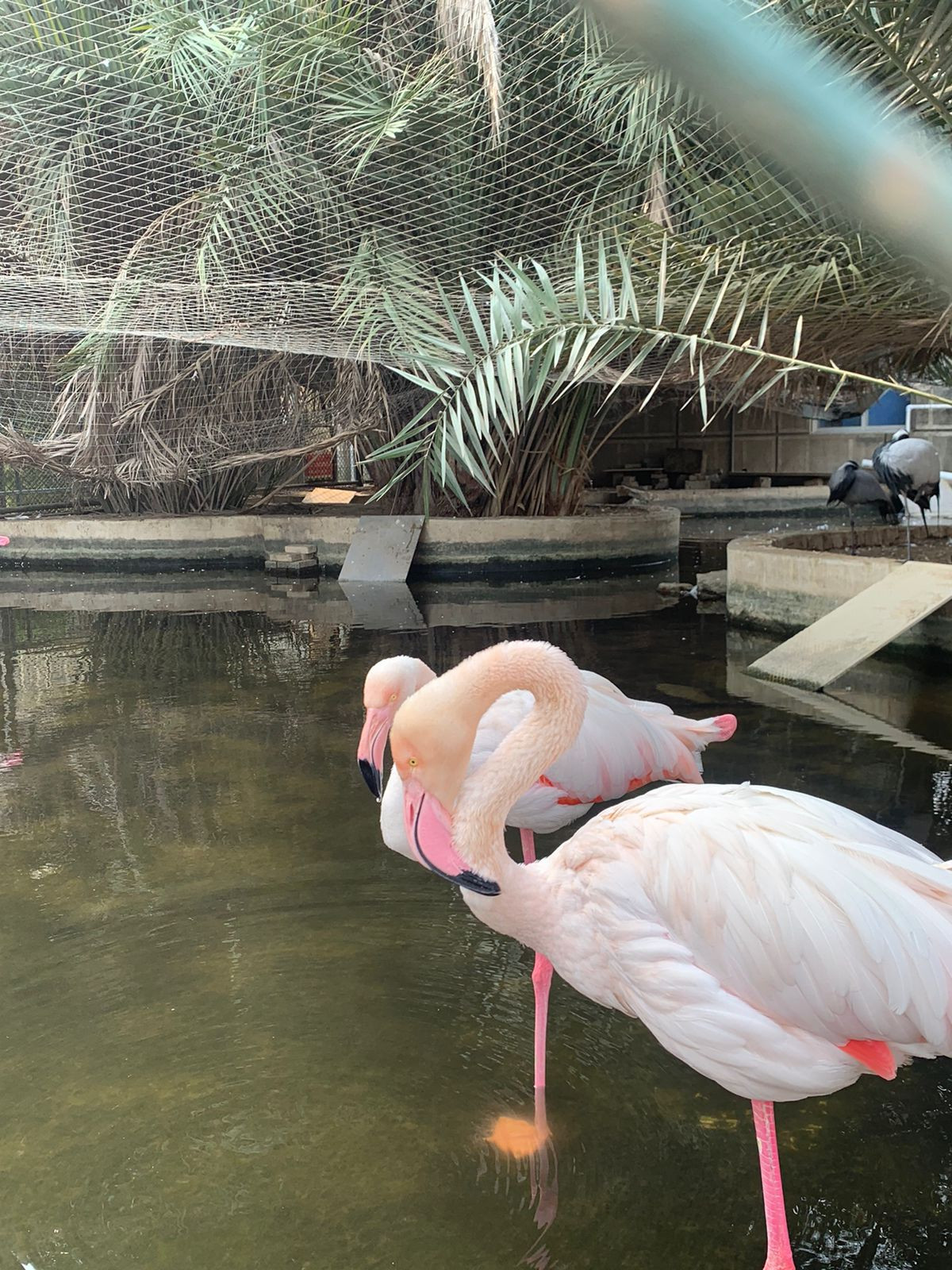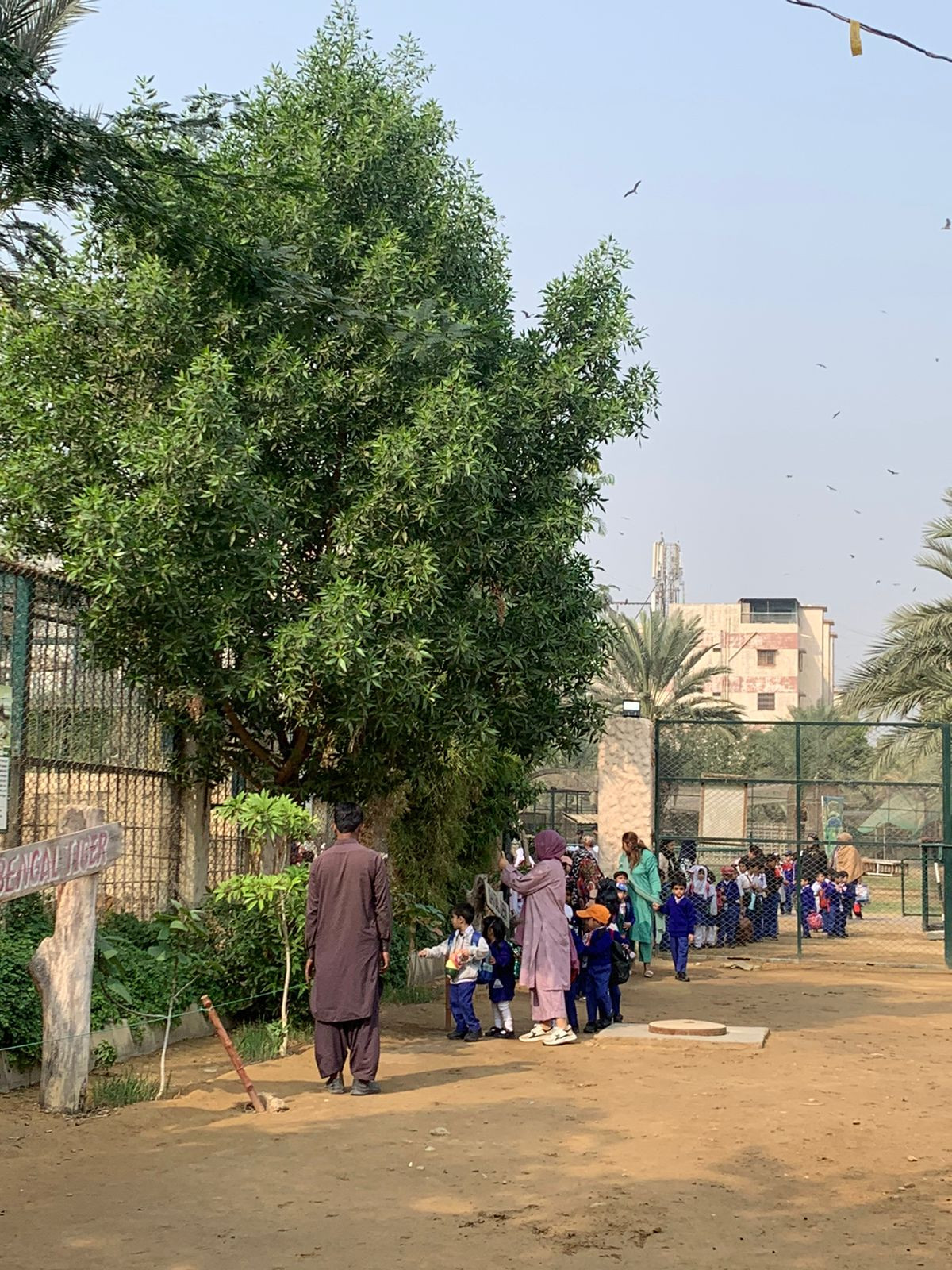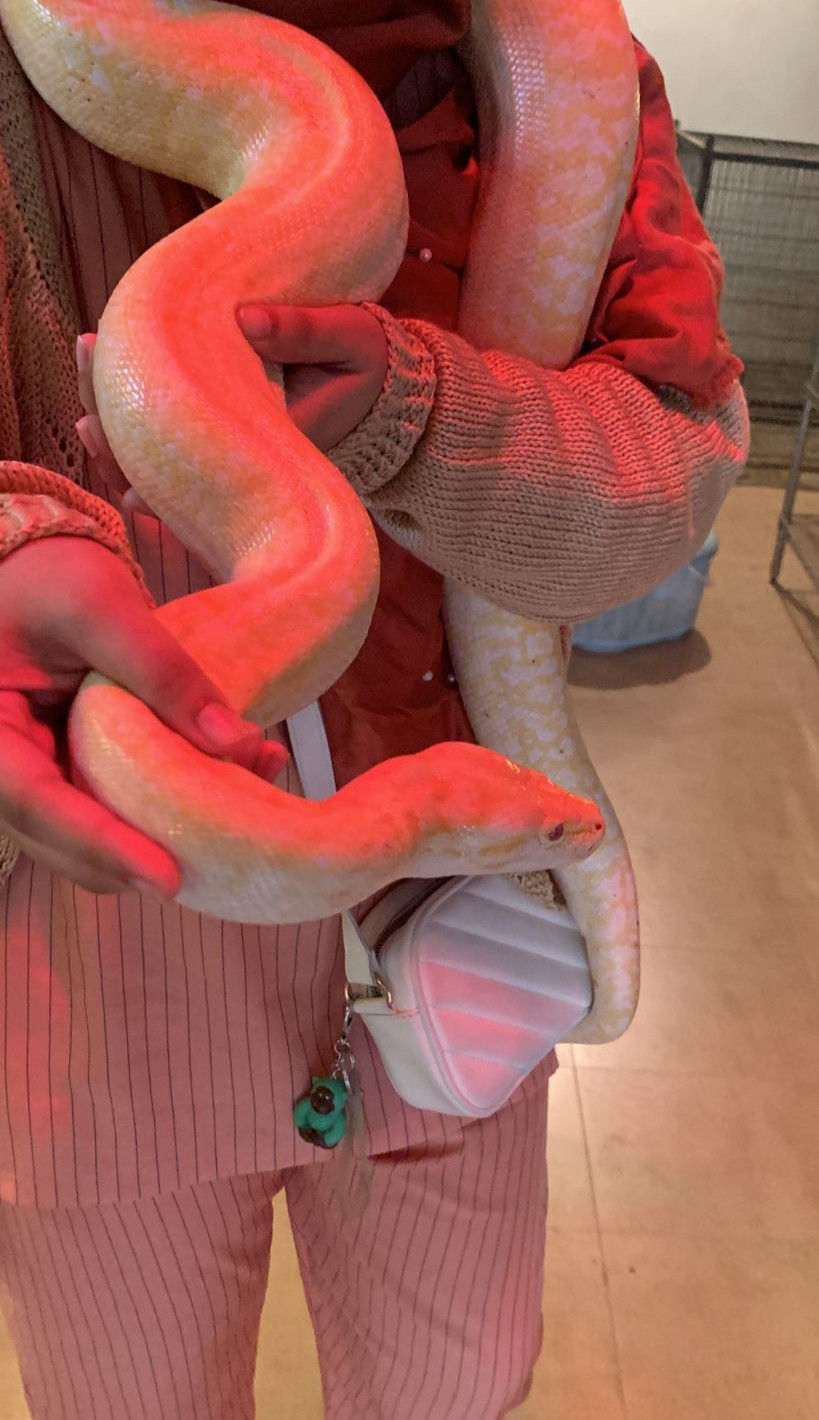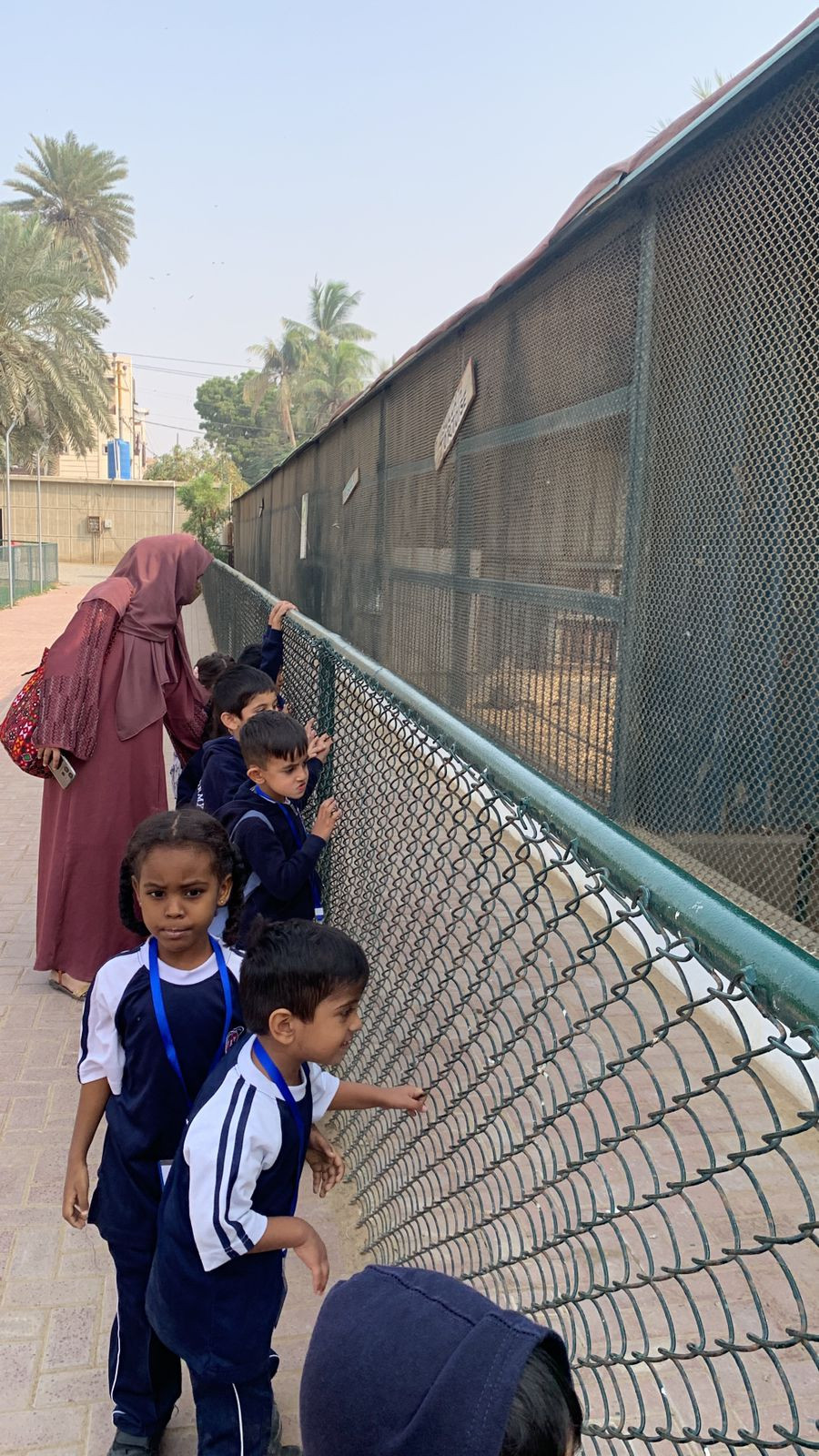Animal lover Junaid Bhimani, aka Jimmy, slid open the door to one of the numerous enclosures of the Reptile Animal Sanctuary housed within Elixir Zoo in North Nazimabad. He pulled out an Albino Burmese Python (the only one found in Pakistan according to Junaid) which instantly coiled itself around Junaid’s neck.
“This one is five months old,” Junaid said. “It will grow up to 15 feet and has the potential to eat a human alive,” he explained while gently stroking the python. The hissing of the other snakes, the purrs of the turtles, and the chirps of the lizards permeated the room. Bhimani proceeded to introduce me to more rare reptiles, including species that are not found elsewhere in Pakistan, such as the Ball Python and Bearded Dragon. He handled these creatures of the wild with the care and ease of handling human babies.
The Elixir Zoo is built on a large plot of land inside Elixir School in Karachi, with a dedicated entrance and pathway for visitors. The pathway has the school sports field on one side and the school building on the other. Upon entering Elixir Zoo, the serene voices of the pinkish-white Mute Swans surround you as the birds playfully swim across the lake in front of the entrance. The zoo is home to more than 300 animals that are kept in large, fenced enclosures, containing trees, rocks, and covered resting areas that are made keeping in mind cleanliness and the different animals’ natural habitats. The zoo was set up by its owner, Bilal Khwaja Mansoor, who is an animal enthusiast and has a passion for promoting animal care in Pakistan. Initially, the zoo’s sole purpose was to breed, groom, and look after endangered animals and increase their population in Pakistan, but it was later opened to the public for entertainment and educational purposes.

Bhimani joined the zoo as head caretaker. At the time, every cage had three animals. Today, each cage has more than six animals, and the number increases each time they breed.
For the past 12 to 13 years, Bhimani has worked with multiple zoos in Karachi for the healthy breeding of animals in Pakistan, including the widely known DanZoo, located in Bahria Town, and the landmark Karachi Zoo. He has also offered private consultations to pet owners.
In school, he was given the name "Jimmy" after the cartoon character Jimmy Neutron because of his unusual love for animals. Not have enough money to support his passion for animals, after starting college, Jimmy took up odd jobs, like providing tuition and selling products. He now holds a master’s degree in sociology from the University of Karachi and is currently pursuing an international diploma in wildlife conservation. His final thesis was on the “Effects of Pet keeping on Human Aggression”, which served as the basis for developing multiple wildlife sanctuaries under his supervision. “The reason I did my master’s in sociology was that I wanted to open a non-governmental organization [NGO] and contribute to society," he said.
Recently, Bhimani, now 30, accomplished that goal by setting up the Wildlife Awareness & Rescue Society which works for the rescue and release of animals. The NGO includes a few veterinary doctors and team members who post videos on social media related to different animals and if they’re legal to keep as pets. People watching these videos contact the NGO and hand over to them the animals that they think should belong to proper zoos. This way, Junaid and his team themselves release animals into their habitats or involve the wildlife departments in the process.

In the early stages, Jimmy fostered his love of animals by keeping chicks, rabbits, and cats as pets, but soon his interest was drawn towards wild animals, and he applied for their license. He obtained all the animals from several importers and private firms in Pakistan. The majority of his animals were farm animals, such as captive-born. They are not sourced from any forest, but rather transferred, gifted, or exchanged from one zoo to another after excessive breeding because the law prohibits animal purchasing. Larger animals are imported this way; however, smaller animals are bought through local markets, online pages, and personal importers. In recent years, Pakistan has stopped the import of wild animals. However, from 2001 to 2007, a large number of animals were imported, which included a variety of lions, deer, and antelopes imported from Africa and Netherlands. The imported animals were sent to multiple private farms, where they were bred and sent to different zoos.
He believes that we should create wildlife sanctuaries and zoos at larger levels, and create the animals’ natural habitats so that if, in the future, these animals are not saved in forests, we can at least save them in our wildlife sanctuaries. “Every animal in a zoo is a prisoner serving its sentence without any crime,” Bhimani said with a sigh. “I agree zoos trap animals, but there are numerous species that are alive today because of some kind of zoo, breeding farm, or wildlife sanctuary; they would have been extinct in forests by now.” Visiting Elixir Zoo and seeing Bhimani’s compassion for animals, and the lively atmosphere at the well-maintained zoo, is a successful example that zoos can indeed offer a safer environment for animals.
He also clarified that keeping wild animals as pets is permissible in Pakistan with proper documentation. “However, you must meet certain criteria, such as having enough space, manpower, and well-maintained cages, in order to receive a license," he said.

Taking care of animals is far from being a fleeting interest for Junaid. He shows commitment to his passion by striving to become a better caretaker of the animals and understand what works and what does not work for them. He carefully examines each species and is equipped with the required machinery, first-aid assistance knowledge, animal care-taking education, and necessary experience to look after the animals and can perform medical procedures whenever needed.
As Jimmy gave me a tour of the zoo, the roars of Simba Watti (the white lion) thundered over the calming sounds of the swans. A brown husky followed me around the confines of the animal-playing zone. He jumped with an energy I could not help but be in awe of. Farther off, some Rhesus Macaque monkeys jumped around, and some sat on trees, and ate the nuts while looking at me with great curiosity.
Unlike all the zoos I have visited in Karachi, the animals in Elixir Zoo were a lot more interactive and excited. A visitor at the zoo agreed with me. Muhammad Abdullah, 10-year-old, is a student at the Elixir school who came to see the animals as part of a mini school trip. Abdullah said, “We often visit this zoo because our school is right beside it, and every time I interact with the animals like the lions or the rabbits, they are always happy and energetic. I feel really happy that these animals get time to step out of their cages and feel free.”
Fatima Hassan had brought her seven-year-old daughter Haya to the zoo. “Elixir Zoo creates a fun and helpful learning environment for children since they have many rare animal species that cannot be found elsewhere, and the cages have all their information nicely written,” she said. “There is also not much public here at a time, which allows children to closely watch the animals, offer them food, and merrily play with them."

The constraints in the career Jimmy chose were significantly greater because Pakistan lacks a specialised industry in this field. It was difficult to explain to others what he wanted to do as a career. "When my parents were looking for a wife for me, they asked me what we would say if the girl's family questioned what I was doing. Tell them he's a zoo consultant, I said. They wanted to know what a zoo consultant is. Is he in charge of keeping the zoo clean? Is he accountable for the welfare of animals? Is he feeding them? Everything, I responded," he said with a chuckle.
Jimmy continued to work for many media outlets and donated all his earnings to Elixir Zoo for the purchase of new animals and their care. “I could not do much for myself, but did everything I could for the wellbeing of the animals I have, be it breeding or import and export," he added.
Bhimani begins his day by looking after the animals at the Elixir Zoo from 8 a.m. until 12 p.m., following which he completes all of his other chores. Spending time with animals has helped him gain a deeper understanding of human emotions. In return, he seeks to encourage others to see their value and be treated with respect. "Animals and humans have similar emotional responses. When animals are happy, their behaviour reflects that. Similarly, when animals are in pain, they react the same way as humans. I get to satisfy my daily need for affection by investing the first half of my day here, which keeps me from being irritated or aggressive," he said.
1708240439-7/IMG-20231128-WA0210(1)1708240439-7.jpg)
Animal care is quite limited in Pakistan. Jimmy thinks that the pet hospitals available in Pakistan are in no way sufficient as compared to those in first-world countries. There are few to no hospitals with proper equipment and qualified vets in Pakistan barring one or two in Karachi, but they too are extremely expensive, making them inaccessible to the general public.
However, Bhimani teaches that taking care of animals is not difficult. If you have the capacity and resources to aid even one animal, you will be able to save many more for the future. "Don't miss a chance to assist animals,” he said. “If nothing else, we can all put a bowl of water on our rooftops to ensure that no animal goes thirsty. If you are willing to help someone, God will open numerous doors for you."
Along with domesticated animals, like dogs and cats, we must show love and attention to wild animals since they have greater chances of going extinct or endangered very soon. "My objective is to promote the hobby of pets on a bigger and better scale in Pakistan. We should consider animals as a part of our society, not apart from it," Bhimani said.
Yusra Batool is a freelance contributor
All facts and information are the sole responsibility of the author
